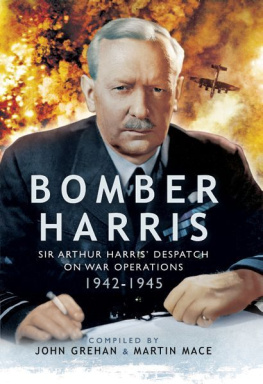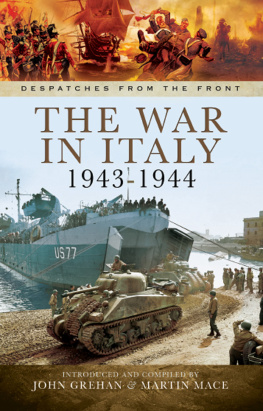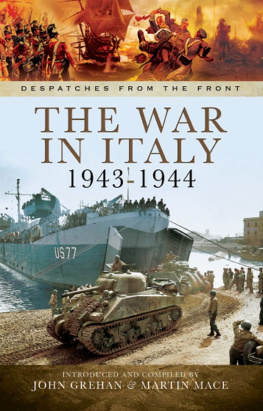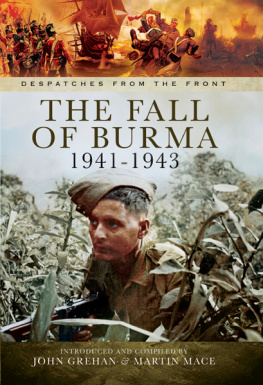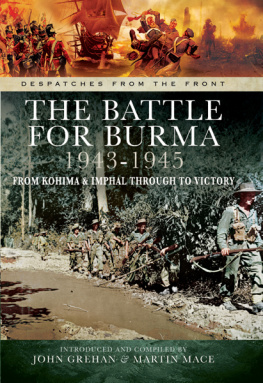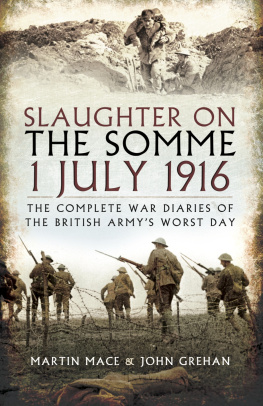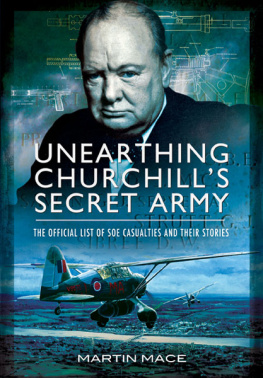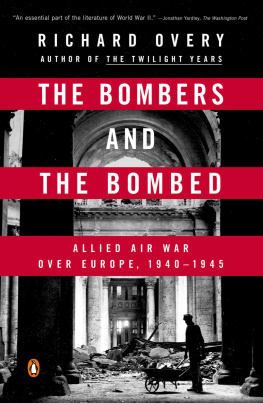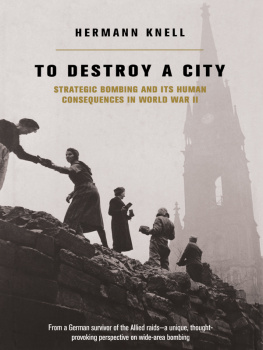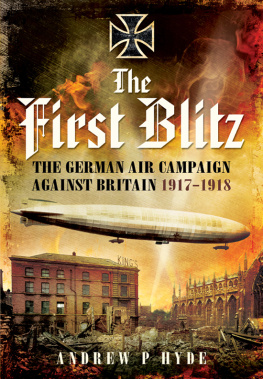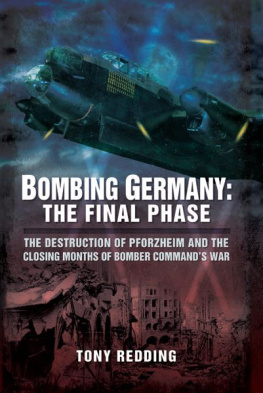
First published in Great Britain in 2014 by
Pen & Sword Aviation
an imprint of
Pen & Sword Books Ltd
47 Church Street
Barnsley
South Yorkshire
S70 2AS
Copyright Martin Mace and John Grehan, 2014
HARDBACK ISBN: 978 1 78303 298 3
PDF ISBN: 978 1 47383 677 8
EPUB ISBN: 978 1 47383 501 6
PRC ISBN: 978 1 47383 589 4
The right of Martin Mace and John Grehan to be identified as Authors of
this Work has been asserted by them in accordance with the Copyright,
Designs and Patents Act 1988.
A CIP catalogue record for this book is available from the British Library.
All rights reserved. No part of this book may be reproduced or transmitted
in any form or by any means, electronic or mechanical including
photocopying, recording or by any information storage and retrieval
system, without permission from the Publisher in writing.
Printed and bound in England
By CPI Group (UK) Ltd, Croydon, CR0 4YY
Pen & Sword Books Ltd incorporates the Imprints of
Pen & Sword Aviation, Pen & Sword Family History,
Pen & Sword Maritime, Pen & Sword Military, Pen & Sword Discovery,
Pen & Sword Politics, Pen & Sword Atlas, Pen & Sword Archaeology,
Wharncliffe Local History, Wharncliffe True Crime, Wharncliffe Transport,
Pen & Sword Select, Pen & Sword Military Classics, Leo Cooper,
The Praetorian Press, Claymore Press, Remember When,
Seaforth Publishing and Frontline Publishing.
For a complete list of Pen & Sword titles please contact:
PEN & SWORD BOOKS LIMITED
47 Church Street, Barnsley, South Yorkshire, S70 2AS, England
E-mail:
Website: www.pen-and-sword.co.uk
C ONTENTS
(b) The Winter Battle [not present in the original Dispatch]
P REFACE
In this book two figures come together as they did in the Second World War, when the relationship was far from an easy one Air Chief Marshal Harris and Group Captain Bufton.
If Arthur Harris was a towering wartime commander, the impact on the Bomber Offensive of Sidney Bufton, an acting Air Commodore at the end of the war, was substantial, but mostly achieved from a desk at the Air Ministry. He served there as Deputy Director of Bomber Operations from November 1941, being moved up to Director in March 1943 and retaining that post until 1945.
Bufton was an articulate and analytical ideas man and somebody who got things done. Whoever had been at the Air Ministry would have incurred the frequent displeasure of Harris his personality and the situation he was in would have made sure of that and there were others in London who came together with Bufton in the AOC-in-Cs contemptuous references to junior staff officers. However, the relationship between Harris and Bufton is perhaps particularly interesting.
Harris was capable of hyperbole and some may have crept in to the letter he wrote to Peter Portal, CAS, on 14 April 1944, in which he remarked that ideas from Bufton, have been and still are rammed down our throats [at Bomber Command] whether we like them or not. I have personally considerable regard for his ability and honesty of purpose. In practice he has been a thorn in our side and the personification of all that is un-understanding and unhelpful in our relations with the Air Staff his name has become anathema to me and my senior staff.
Other passages in the letter might be argued to be insubordinate towards CAS. The idea of removing Harris did come to Portal from time to time, but he always saw the value of putting up with the difficulties, as well as recognising that such a plan would not be acceptable to the Prime Minister. Portal also highly valued Sid Bufton and, according to Denis Richards in Portal of Hungerford, even consulted him on whether to keep Harris in post. Bufton proved firmly in favour of the status quo.
At the time that Bert Harris wrote the letter, the main point of issue was the Pathfinder Force, something on which the clash between Harris and Bufton had previously been fundamental.
In his biography, Bomber Harris his Life and Times, Henry Probert wrote that Harris first heard of the proposal for such a force shortly after he had arrived at Bomber Command. Portal passed to him a letter from Lord Cherwell, close adviser to the Prime Minister, suggesting that one bomber group should be specifically given the task of target finding.
Portal seems to have been surprised by the determination of the opposition Harris mounted to the suggestion. For one thing Harris considered that if the cream of crews were skimmed for the chosen group from across the Command, as they would surely have to be, then the effect on the morale of the rest would be highly detrimental.
Bufton was a convinced and courageous champion (The Strategic Air Offensive Against Germany, Webster and Frankland) of such a force and would be credited by Portal with being its main architect at the Air Ministry.
Faced with Harriss opposition and that of his senior team (albeit expressed in the presence of Harris) Bufton made a move which would probably have riled a more placid Commander-in-Chief than Harris. Without telling Harris in advance, Bufton wrote to a significant number of his service contacts, plenty of them in Bomber Command, explaining his ideas on the subject of target marking and enclosing a questionnaire. He then showed the replies, endorsing specialised target marking, to Harris.
One of Buftons reasons for taking this bold step (though the response from Harris was restrained) was his operational background in Bomber Command and his belief (not entirely fairly or logically held) that Harris and most of his close subordinates suffered in their decision-making because they lacked such recent experience.
Bufton had commanded 10 Squadron, flying nineteen operations in Whitleys, before moving to 76 Squadron, the second to fly the Halifax operationally, and commanding RAF Pocklington. He was awarded the DFC. His youngest brother, John, had been lost in a Hampden of 49 Squadron.
At a much higher level than Bufton, Harris lost the argument over what became the Pathfinders. However, as was often the case with him, he accepted the new situation with some grace, though certainly not enthusiasm.
On the first occasion that the new force operated Harris sent a message to Donald Bennett, whom he had selected to be its leader, rather than Basil Embry whose name had been put forward. Harris had served with them both, with Embry in Iraq and with Bennett amongst the flying boats at Pembroke Dock.
In part the message to Bennett read, All the crews of Bomber Command now look to the Pathfinders for a lead to their future objectives which will ensure the maximum infliction of damage on the enemy with the greatest economy of force. They will I know not be disappointed. Good luck and good hunting.
Any situation involving two or more men or women needs to be considered against the background of their previous relationships. Sidney Buftons comments in this book are, I suggest, the more interesting for knowing something of his previous dealings with Arthur Harris.
Today papers that belonged to Air Chief Marshal Sir Arthur Harris rest in the RAF Museum, Hendon, while a collection of Air Vice Marshal Buftons papers and photographs, particularly relating to Bomber Command, can be found at the Churchill Archives Centre, Churchill College, Cambridge.
Geoff Simpson
L IST OF I LLUSTRATIONS
through its mine-laying work. Indeed, this could be considered one of the most successful campaigns of the Second World War. Every large, expensive enemy ship lost to mines cost the RAF 0.55 bombers. Compare this to the more well-known Coastal Command strike wings, which suffered 5.28 aircraft lost to every ship sunk while accounting for a smaller figure of 20% of German-controlled shipping losses. (ww2images)
Next page
